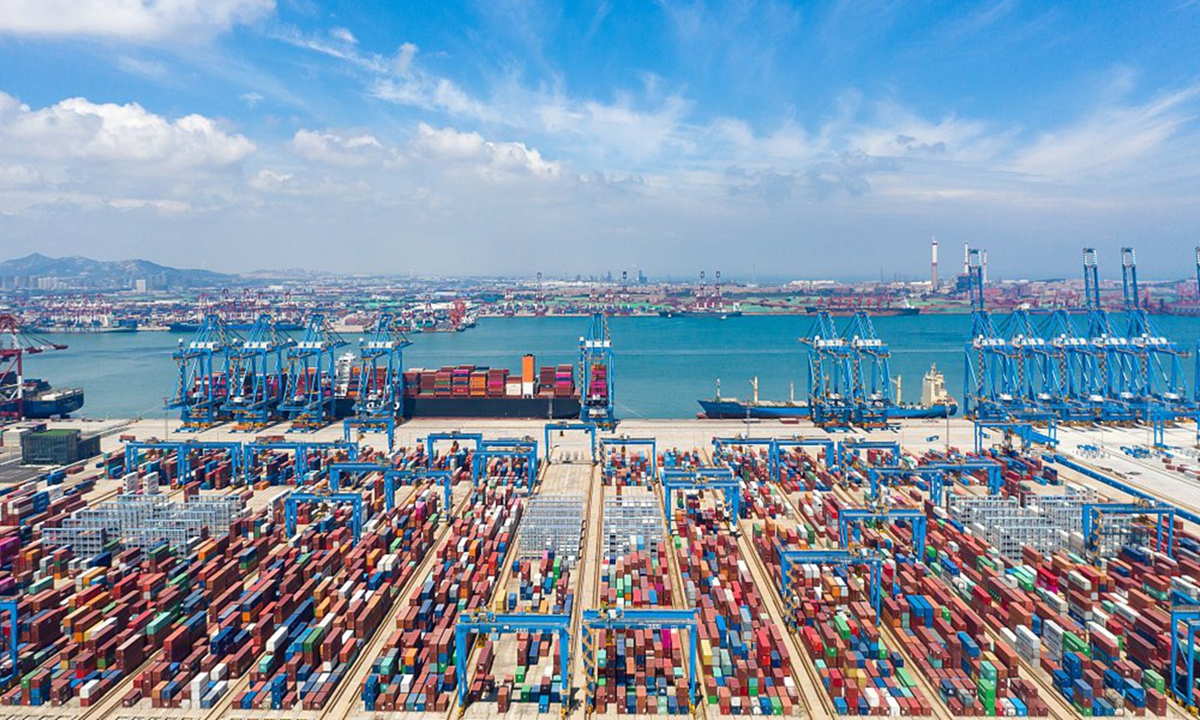
China trade economy File photo: VCG
Chinese officials on Wednesday swiftly pushed back against US ratings agency Fitch's move to cut China's sovereign credit rating outlook to negative from stable, stressing that China's long-term growth prospects remain unchanged and the Chinese government has the ability and determination to maintain sound sovereign credit.
Chinese economists also slammed the ratings agency's decision, saying that Fitch's move shows profound bias and methodological flaws, as it apparently relied heavily on negative headlines from Western media and failed to show growing positive factors within the Chinese economy. In comparison, China's economy remains the healthiest among major economies, they noted.
In a report, Fitch said it has revised the outlook on China's Long-Term Foreign-Currency Issuer Default Rating (IDR) to Negative from Stable, and affirmed the IDR at 'A+.'
"The outlook revision reflects increasing risks to China's public finance outlook as the country contends with more uncertain economic prospects amid a transition away from property-reliant growth to what the government views as a more sustainable growth model," Fitch said.
In affirming China's 'A+' rating, Fitch pointed to China's large and diversified economy, still solid GDP growth prospects relative to peers, integral role in global goods trade, robust external finances, and reserve currency status of the yuan.
Essentially, Fitch's move means that while China's ratings remain unchanged for now, a downgrade might be possible in the medium term. The decision drew swift criticism from Chinese officials.
"We regret to see Fitch downgrade China's sovereign credit rating outlook," an official from China's Ministry of Finance (MOF) said during a media Q&A on Wednesday, noting that while Fitch's report reflected some views the Chinese side already expressed, the result showed that the indicator system of Fitch's sovereign credit rating methodology fails to effectively and forward-lookingly reflect the positive role of China's fiscal policy in promoting economic growth and stabilizing the macro-leverage ratio.
China has maintained a policy of moderately expanding fiscal spending while improving the efficiency and effectiveness of fiscal funds to boost domestic demand and economic development.
"In the long run, maintaining a moderate deficit and making good use of precious debt funds will help expand domestic demand, support economic growth, and ultimately help maintain good sovereign credit," the MOF official said, adding that China's plan to keep deficit-to-GDP ratio at 3 percent in 2024 is moderate and reasonable, and is conducive to stabilizing economic growth, controlling government debt levels and reserving policy space to tackle potential risks and challenges.
Also commenting on Fitch's move on Wednesday, Mao Ning, a spokesperson for the Chinese Foreign Ministry, said the long-term positive momentum of the Chinese economy has not changed, and the Chinese government's ability and determination to maintain sound sovereign credit also remain unchanged.
Biased, flawed report
Chinese economists also questioned the objectivity and accuracy of Fitch's decision.
"Western ratings agencies like Fitch often adopt a Western model and interpret China's credit ratings through some negative market fluctuations. I think such an interpretation is not accurate," Cong Yi, a professor at the Tianjin University of Finance and Economics, told the Global Times on Wednesday.
Cong said Fitch only relied on some short-term fluctuations in areas such as local debt and the property sector, instead of the full picture of China's economic transition, which is undertaken by China in order to move away from the previous model of relying on land sales to a new model of development. "Exaggerating small issues and using Western models to judge China's development are signs of the lack of understanding China."
Cao Heping, an economist at Peking University, also said that Fitch's methodology is flawed, as it's clearly biased toward negative factors, while ignoring variables in China's economic resilience and future prospects.
"Even as a growing number of economic data showed improvements in the first two months, Fitch actually moved to cut China's ratings outlook. That shows that foreign ratings agencies specifically selected some unfavorable indicators in their evaluation," Cao told the Global Times on Wednesday.
A slew of recent data showed that China's economic recovery has been picking up pace. For example, China's official manufacturing purchasing managers' index (PMI), a main gauge of factory activity, stood at 50.8 in March, returning to expansion territory for the first time since September 2023. China's exports have also been improving remarkably this year, with exports jumping by 10.3 percent in the first two months of 2024. Retail sales also expanded by 5.5 percent in the first two months.
"Some economic indicators in the first quarter of this year have shown a good start to the year and are moving in the direction of restorative growth. Our goal is innovation-driven development, and we have gradually gained new development trends during the transformation process," Cong said.
Chinese economists also drew comparison between China's economic development and debt levels and those of other major economies, concluding that China remains the healthiest among advanced economies.
"China's fiscal deficit is within a reasonable range. If we compare it to that of Japan, the US or the EU, China's deficit is much lower," Cao said. "I am very confident in China's economic growth this year and strong first-quarter data will offer great rebuttal to Fitch's downgrade."


